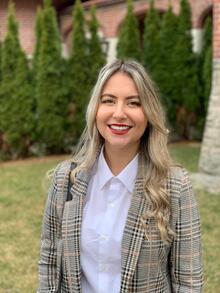Why did you choose to pursue graduate studies at the University of Waterloo?
There are several reasons why I chose to do my PhD at UWaterloo. First of all, I believe that the School of Public Health Sciences (SPHS) is one of the strongest in the country. The plethora of varied high quality and innovative research coming out of Waterloo is incredible, and I am excited to be a part of it. My research supervisor also does lots of work on international food policy, which is my area of interest, and I think I will be able to learn a lot from him. Aside from the school and my specific supervisor, I also picked Waterloo for its student community. I did my undergrad and masters at Ryerson University in Toronto. Because the university is located downtown I was able to explore the city, try lots of different foods and attend a variety of events... but it also meant that many students (like me) were commuters. I am looking forward to experiencing a stronger student community presence at Waterloo.
 Describe your research and what makes you passionate about it:
Describe your research and what makes you passionate about it:
My research focuses on public health nutrition for children and youth. I am interested in examining the differences in food programs and policies internationally, specifically: marketing of foods and beverages to kids, nutrition labelling, school meal programs, globalization and kids' urban built environment. Childhood and adolescence are pivotal life stages for the development of healthy eating behaviours, which can predict the risk of chronic disease development in later life.
Tell us about where you are from:
I have a BASc in Nutrition and Food (double minor in French and Psychology) and an MHSc in Nutrition Communication. These programs were fundamental in helping me become a licensed registered dietitian. I have experience with clinical and public health dietetics and am registered with the College of Dietitians of Ontario. I think being a registered health professional helps me bring a more applied lens to my research and I am excited to expand on my practical skills through more theoretical training.
How do you spend your free time?
In my free time, I am a Senior Editor at the Health Science Inquiry (HSI) Academic Journal wherein I help manage manuscripts through the peer-review process. The HSI is a great graduate student-led initiative which promotes conversation between grad students at different Canadian universities around pertinent health topics and helps foster a community of emerging scientists.
Aside from that, I like to experiment with different recipes (mostly successfully), attempt to train my cat, and (in non-pandemic times) travel. My favourite place that I've been has to be Kyoto, Japan!
What are some of the challenging aspects of being a graduate student and how do you address these challenges?
I think one of the hardest aspects of being a grad student is wanting to say "yes" to everything! As a new researcher, there are always so many possible enriching opportunities but also many conflicting responsibilities. At times, it may be difficult to turn down opportunities because you feel like you might be missing out... except that if you say "yes" all the time you will quickly find yourself working morning to night with no downtime. I try to tackle this by purposefully scheduling time for myself (whether that be a 30-minute walk at lunch every day or reserving Sundays for friends and family). At the end of the day, there are many fantastic opportunities available to you as a grad student but you also have to make sure that you are making space for your well-being.
Do you have anything else you’d like to share that is interesting about yourself?
I did a Summer Language Program in French Studies at the Université Grenoble Alpes during my undergrad. It was an amazing experience and helped me in earning a certificate of proficiency in French. I definitely recommend doing a semester abroad if you're able, especially if you are trying to learn/master a language.
Country of origin: Canada
Domestic or International: Domestic
Academic stream: Research
Full-time or part-time: Full-time
Research supervisor: Dr. David Hammond
Graduate student awards held: Provost Doctoral Entrance Award for Women
TA/RA or GRS held: TA/RA




